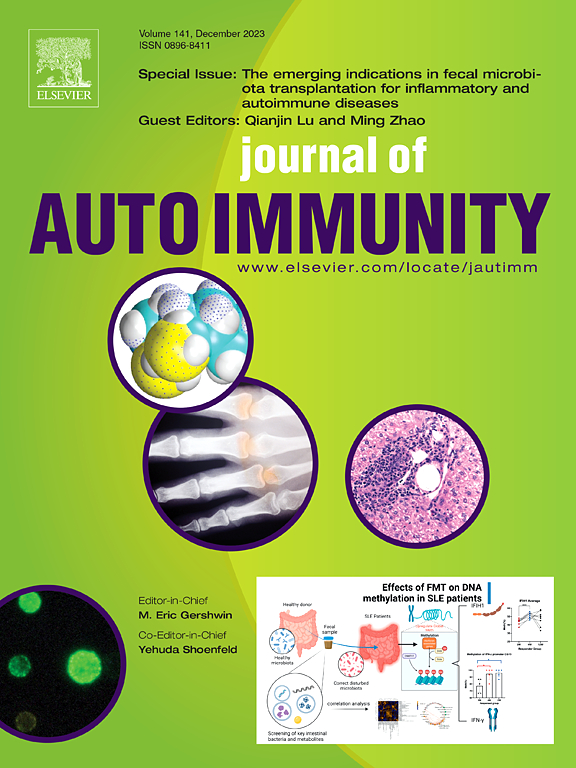家庭硬水暴露与成人银屑病发病之间的关系:英国生物库队列研究的启示。
IF 7
1区 医学
Q1 IMMUNOLOGY
引用次数: 0
摘要
虽然接触硬水与各种皮肤炎症有关,但硬水与牛皮癣之间的具体关系尚未明确界定。我们分析了来自英国生物银行队列的486,414名参与者的数据,以探索家庭硬水暴露与牛皮癣发病率之间的关系。家用水硬度,以碳酸钙浓度测量,于2005年从威尔士、苏格兰和英格兰的当地供水商处获得。在大约14年的中位随访期间,总共有4801名(1.0%)参与者报告了牛皮癣,我们观察到,水的硬度(如碳酸钙₃)每增加50 mg/L,牛皮癣的风险就增加3%[风险比(HR) = 1.03, 95%置信区间(CI) 1.01-1.06]。与接触软水(0-60 mg/L)的个体相比,接触极硬水(0- 180 mg/L)的个体患牛皮癣的风险增加了20% [HR: 1.20, 95% CI: 1.07-1.34]。水硬度与银屑病发病风险呈线性正相关。此外,多基因风险评分显示硬水暴露与遗传风险因素在银屑病发病中的协同作用。亚组分析表明,硬水对牛皮癣的影响在低多基因风险评分人群、女性、老年人、非肥胖人群、高社会经济地位人群和无血脂异常人群中更为明显。住宅用水硬度已被确定为成人牛皮癣的重要危险因素。持续努力减少接触硬水可能减轻牛皮癣的负担。本文章由计算机程序翻译,如有差异,请以英文原文为准。

Associations between domestic hard water exposure and incident psoriasis in adults: Insights from the UK Biobank cohort study
Although exposure to hard water is associated with various inflammatory skin conditions, the specific relationship between hard water and psoriasis has not been clearly defined. We analyzed data from 486,414 participants in the UK Biobank cohort to explore the association between domestic hard water exposure and the incidence of psoriasis. Domestic water hardness, measured in calcium carbonate concentration, was obtained in 2005 from local water providers in Wales, Scotland, and England. During a median follow-up period of approximately 14 years, a total of 4801 (1.0 %) participants reported psoriasis, and we observed that for every 50 mg/L increase in water hardness (as CaCO₃), there was a 3 % increase in the risk of psoriasis [Hazard Ratio (HR) = 1.03, 95 % Confidence Interval (CI) 1.01–1.06]. Individuals exposed to very hard water (>180 mg/L) exhibited a 20 % increased risk of psoriasis compared to those exposed to soft water (0–60 mg/L) [HR: 1.20, 95 % CI: 1.07–1.34]. A positive linear relationship was observed between water hardness and the risk of psoriasis. Furthermore, the polygenic risk score indicated a synergistic effect between hard water exposure and genetic risk factors in developing psoriasis. Subgroup analysis suggested that the effect of hard water on psoriasis is more pronounced in individuals with a low polygenic risk score, women, the elderly, non-obese individuals, those of high socioeconomic status or without dyslipidemia. Residential water hardness has been identified as a significant risk factor for psoriasis in adults. Sustained efforts to reduce exposure to hard water may alleviate the psoriasis burden.
求助全文
通过发布文献求助,成功后即可免费获取论文全文。
去求助
来源期刊

Journal of autoimmunity
医学-免疫学
CiteScore
27.90
自引率
1.60%
发文量
117
审稿时长
17 days
期刊介绍:
The Journal of Autoimmunity serves as the primary publication for research on various facets of autoimmunity. These include topics such as the mechanism of self-recognition, regulation of autoimmune responses, experimental autoimmune diseases, diagnostic tests for autoantibodies, as well as the epidemiology, pathophysiology, and treatment of autoimmune diseases. While the journal covers a wide range of subjects, it emphasizes papers exploring the genetic, molecular biology, and cellular aspects of the field.
The Journal of Translational Autoimmunity, on the other hand, is a subsidiary journal of the Journal of Autoimmunity. It focuses specifically on translating scientific discoveries in autoimmunity into clinical applications and practical solutions. By highlighting research that bridges the gap between basic science and clinical practice, the Journal of Translational Autoimmunity aims to advance the understanding and treatment of autoimmune diseases.
 求助内容:
求助内容: 应助结果提醒方式:
应助结果提醒方式:


